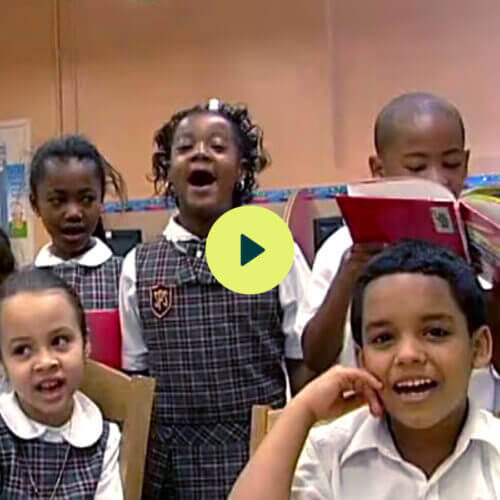Our history
Investing in youth literacy skills and mental health since 1986
Since its earliest efforts revitalizing a New York City Harlem block in the late 1980s, Carmel Hill Fund has blended deep community investment with bold educational innovation.


Our founder
From a successful business leader to a visionary philanthropist
William “Bill” Ruane, was a successful businessman and an even more remarkable human being. Born in 1925, Bill grew up in a middle class neighborhood in Chicago. He co-founded and co-managed the Sequoia Fund, one of the most consistently high-performing investment funds on Wall Street.
Bill approached his philanthropic work with the same keen intelligence, meticulous attention to detail, concern for others, and wonderfully easygoing humor that he brought to the business world. He was a hands-on, engaged philanthropist who worked closely with grantee partners – whom he considered to be the experts – to address issues of mutual concern. Each interaction ended with a question about what else he could do to be helpful. Bill was passionate about righting educational inequities and addressing the mental health struggles young people were experiencing. He was generous both in his financial giving and in his immense level of personal involvement with his philanthropic initiatives.

William “Bill” Ruane
Founder, Carmel Hill Fund
The Early Years
Revitalizing a block in Harlem set the stage for growth
Bill founded Carmel Hill Fund in 1986. Shortly thereafter, the Fund accomplished its first major success – the revitalization of a block on 118th Street in Harlem distraught by drug abuse and property neglect. Teaming up with Children’s Aid Society, Carmel Hill Fund worked to reduce crime, bring the buildings up to code, and support tenants in accessing vital social services.
Bill’s goal was to elevate children from the most desperate living conditions into stable situations to help break the cycle of poverty in a cost-effective and replicable way.
After Carmel Hill Fund petitioned the proper authorities to restore the buildings and worked with Children’s Aid Society to begin providing services to the block’s residents, Bill took a closer look at the children who lived on 118th Street. He discovered that on just that one block, 80 elementary grade students were attending 26 different schools. This led to his realization that a strong sense of community could be threatened with the block’s children scattered in so many directions, so he searched for one school they all could attend. As a result, he found St. Paul School, a small Catholic elementary school a few blocks away that was on the verge of closing due to insufficient funds. Bill supported the school to keep it from closing and established a scholarship program that allowed the 118th Street children to attend St. Paul School for a nominal fee.
Read more about Bill Ruane’s work in Renewing a Block in Harlem, part 1 and part 2.
Expanding opportunities
Literacy technology transforms student reading
After more than a decade of investment and support, new technology solutions were emerging that had the potential to transform the literacy landscape and, in 2001, upon a suggestion from St. Paul School’s principal Agnes Sayaman, Bill purchased the Accelerated Reader program from Renaissance Learning to support the 270 students enrolled in the school. The results were quick in coming and overwhelming in their magnitude.
Between 2001 and 2003, St. Paul’s overall school score on the achievement assessment Iowa Test of Basic Skills (ITBS) increased by 70%. St. Paul School went from scoring near the bottom quartile as compared to schools nationally in 2001, to scoring 8% above the national median in 2003. The impact from this new technology-supported era was a turning point for the Fund’s approach, setting the stage for a more focused programming structure.
Words from our Founder
I always had this very, very strong feeling that one way to lift the educational level is to make sure children can read. If they can’t read, they really can’t handle any subject well… the three Rs of education are Reading, Reading, Reading.
Bill Ruane, Founder

Carmel Hill Fund Education Program
Building literacy skills and a vibrant reading culture
In 2004, Bill established the Carmel Hill Fund Education Program (CHFEP) to later expand to other schools in need and selected three locations:
- New York City, New York
- Denver, Colorado
- Monroe, Louisiana
In addition to pursuing other initiatives to enhance youth education, CHFEP was responsible for working with more than 100 schools to develop robust reading cultures, integrating assessments and impactful solutions into their instructional practices. The three sites brought to life the programmatic core value of collaboration, working with administrators and educators in all three states with a common aim of fostering students’ love of reading.
Learn more about the impact of the CHFEP program over its 20 year history and how it supported students and educators in each region.
A lasting legacy
Staying grounded in our roots while focused on the future
Bill Ruane passed away in 2005, and his legacy lives on through Carmel Hill Fund’s ongoing investment in the next generation through grants that support youth literacy and mental health. As the foundation returns to its original focus on youth in New York City, we are committed to upholding his collaborative approach with our grantee partners.
